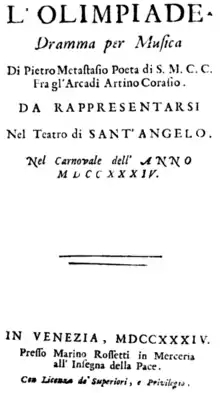L'Olimpiade (Vivaldi)
L'Olimpiade (The Olympiad, RV 729) is a dramma per musica in three acts that was composed by Antonio Vivaldi. The opera uses an Italian libretto by Pietro Metastasio that was originally written for Antonio Caldara's 1733 opera of the same name. Vivaldi's version premiered in Venice at the Teatro Sant'Angelo on 17 February 1734. The same libretto was to be later set to music by over 50 other composers, starting from Giovanni Battista Pergolesi in 1735.
| L'Olimpiade | |
|---|---|
| Dramma per musica by Antonio Vivaldi | |
 Title page of the libretto | |
| Librettist | Pietro Metastasio |
| Language | Italian |
| Premiere | |
Roles
| Role | Voice type[1] | Premiere cast[1] 17 February 1734 |
|---|---|---|
| Clistene, king of Sicione | tenor | Marc'Antonio Mareschi |
| Aristea, his daughter, in love with Megacle | contralto | Anna Cattarina della Parte |
| Argene, a lady from Crete disguised as a shepherdess under the name of Licori, in love with Licida | contralto | Marta Arrigoni |
| Megacle, in love with Aristea, friend of Licida | soprano castrato | Francesco Bilanzoni |
| Licida, believed to be the son of the king of Crete, in love with Aristea, friend of Megacle | contralto (travesti role) | Angela Zanucchi |
| Aminta | soprano castrato | Marianino Nicolini |
| Alcandro, friend of Clistene | bass | Massimiliano Miller |
Synopsis
- Time
- Place
Act 1
Megacles arrives in Sicyon just in time to enter the Olympic Games under the name of Lycidas, a friend who once saved his life. Unknown to Megacles, Lycidas is in love with Aristaea, whose hand is to be offered to the winner of the games by her father, King Cleisthenes. Lycidas, once betrothed to Princess Argene of Crete, is unaware that Megacles and Aristaea already love each other, and he subsequently tells his friend of the prize. Aristaea and Megacles greet each other fondly, but Megacles now feels bound by his promise to compete as Lycidas. Meanwhile, Argene arrives in Olympia disguised as a shepherdess, to win back Lycidas.
Act 2
Megacles wins the games, confesses the truth to Aristaea and departs, broken-hearted. When Lycidas comes to claim her, Aristaea reproaches him, as does the disguised Argene, much to his dismay. Amyntas, tutor to Lycidas, reports that Megacles has drowned himself, and King Cleisthenes, apprised of the deception, banishes Lycidas.
Act 3
Argene prevents the desperate Aristaea from suicide, Megacles is rescued by a fisherman, and Lycidas contemplates the assassination of the king. Aristaea pleads mercy for Lycidas and Argene offers herself in his place; as proof that she is a princess, she shows Cleisthenes a chain given her by Lycidas. He recognizes it as belonging to his son, abandoned in infancy to forestall the prophecy that he would kill his father. Lycidas, reinstated, accepts Argene, leaving his sister to Megacles.
See also
- L'Olimpiade, Pietro Metastasio's libretto
References
Notes
- Voice types and premiere cast according to Strohm (II, pp. 530-531). Because of an oversight the character of Alcandro is not included in the cast list reported at the beginning of the chapter on L'Olimpiade. It is however mentioned below in the same chapter (section: "The action and the music", p. 534 ff), along with the first performer's name and voice type.
Sources
- Pietro Metastasio, L'Olimpiade. Dramma per musica, Venice, Rossetti, 1734 (digitized by Library of Congress)
- Neville, Don, "L'Olimpiade", Grove Music Online ed. L. Macy (Accessed November 21, 2008), (subscription access)
- Strohm, Reinhard, The operas of Antonio Vivaldi, Florence: Olschki, 2008. ISBN 978-88-222-5682-9